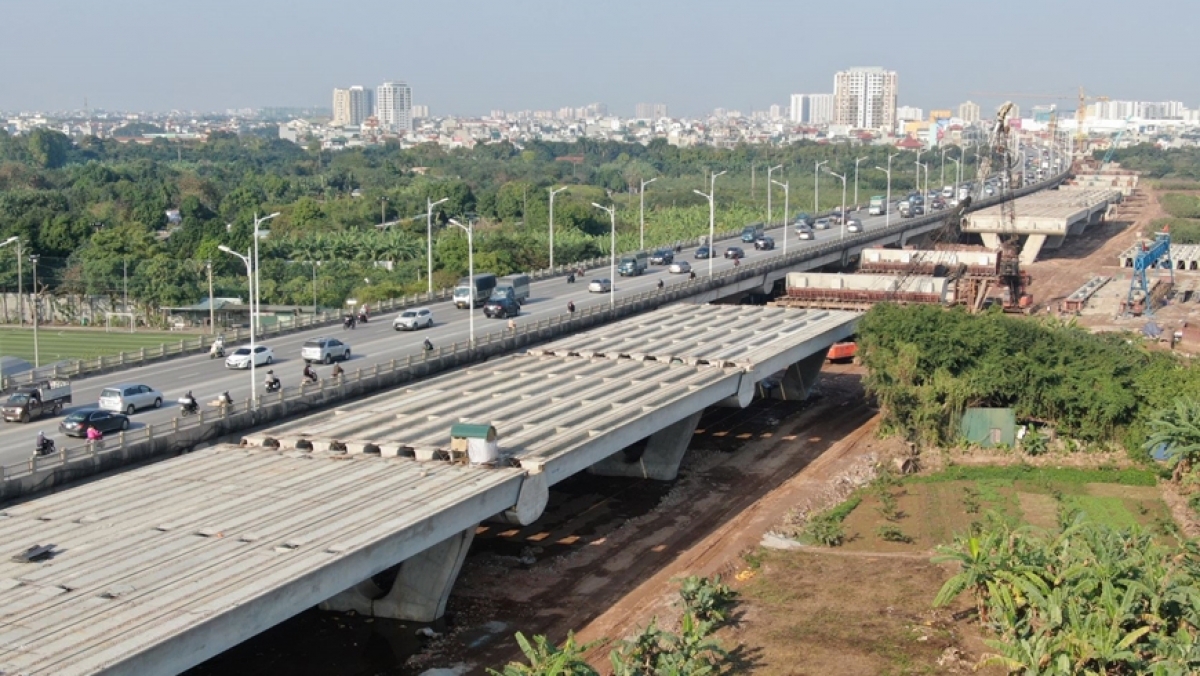Hanoi enjoys positive economic growth in first quarter
VOV.VN - The capital’s economic growth rate during the first quarter of the year showed signs of a remarkable improvement thanks to timely and effective solutions, demonstrating its resilience and development after suffering from the impact of the COVID-19 pandemic.
According to data detailed by the Hanoi Department of Planning and Investment, the opening quarter of the year saw Hanoi’s gross domestic product (GDP) expand by 5.83%, a figure 1.16 times higher than that of the whole country. In addition, it was in line with the capital’s growth scenario of between 5.7% and 6.2%.
Of the figure, services increased by 6.15%, industry - construction rose by 5.61%, and agriculture, forestry and fishery climbed by 3.39%. This represents a very important increase due to the recovery trend being seen across multiple sectors and fields.
Le Van Quan, deputy director of the Hanoi Department of Planning and Investment, said that early this year the capital had outlined an economic growth scenario for each quarter, each industry, and each field, before issuing a plan for economic recovery and development of the construction industry.
These great efforts taken by competent agencies and enterprises in a bid to promote production and business, as well as flexibly responding to the pandemic, also helped ensure large balances, revenue, and expenditure.
During the first quarter of the year, Hanoi's total state budget revenue reached over VND102,000 billion, equaling 32.9% of the estimate, up more than 19% over the same period from last year. Indeed, the majority of the capital's key economic indicators also posted an increase.
Tran Thi Phuong Lan, acting director of the Hanoi Department of Industry and Trade, said that the city's primary focus on developing industries has been less affected by the COVID-19 pandemic. Indeed, the capital has found adaptive solutions for pandemic-hit areas which has helped to give a fresh boost to production and business activities in the process of recovery and development.
With regard to the disbursement results of public investment capital throughout the reviewed period, the capital disbursed VND4,111 billion, duly meeting 8% of the plan, representing a rise of 26.7% on-year. Hanoi defined the annual plan for public investment disbursement as an important task aimed at boosting economic development in the context of the national economy being heavily impacted by the COVID-19 pandemic.
Furthermore, the Hanoi People's Committee has requested that departments, agencies, People's Committees of districts, towns, and investors mobilise all resources, improve the efficiency of public investment, and speed up the implementation of public investment projects on schedule from the start of the year.
Under the Socio-Economic Development and Recovery Program, Hanoi also aims to promote economic growth, innovative start-ups, and digital transformation in order to lay a foundation for sustainable development. This will be done while striving to fulfill the highest growth target of 8% and keep the urban unemployment rate at below 4%.
Another of the capital's focus is also on reducing costs, supporting cash flow, and facilitating activities of businesses, economic organisations, and citizens.
According to data detailed by the Hanoi Department of Planning and Investment, the opening quarter of the year saw Hanoi’s gross domestic product (GDP) expand by 5.83%, a figure 1.16 times higher than that of the whole country. In addition, it was in line with the capital’s growth scenario of between 5.7% and 6.2%.
Of the figure, services increased by 6.15%, industry - construction rose by 5.61%, and agriculture, forestry and fishery climbed by 3.39%. This represents a very important increase due to the recovery trend being seen across multiple sectors and fields.
Le Van Quan, deputy director of the Hanoi Department of Planning and Investment, said that early this year the capital had outlined an economic growth scenario for each quarter, each industry, and each field, before issuing a plan for economic recovery and development of the construction industry.
These great efforts taken by competent agencies and enterprises in a bid to promote production and business, as well as flexibly responding to the pandemic, also helped ensure large balances, revenue, and expenditure.
During the first quarter of the year, Hanoi's total state budget revenue reached over VND102,000 billion, equaling 32.9% of the estimate, up more than 19% over the same period from last year. Indeed, the majority of the capital's key economic indicators also posted an increase.
Tran Thi Phuong Lan, acting director of the Hanoi Department of Industry and Trade, said that the city's primary focus on developing industries has been less affected by the COVID-19 pandemic. Indeed, the capital has found adaptive solutions for pandemic-hit areas which has helped to give a fresh boost to production and business activities in the process of recovery and development.
With regard to the disbursement results of public investment capital throughout the reviewed period, the capital disbursed VND4,111 billion, duly meeting 8% of the plan, representing a rise of 26.7% on-year. Hanoi defined the annual plan for public investment disbursement as an important task aimed at boosting economic development in the context of the national economy being heavily impacted by the COVID-19 pandemic.
Furthermore, the Hanoi People's Committee has requested that departments, agencies, People's Committees of districts, towns, and investors mobilise all resources, improve the efficiency of public investment, and speed up the implementation of public investment projects on schedule from the start of the year.
Under the Socio-Economic Development and Recovery Program, Hanoi also aims to promote economic growth, innovative start-ups, and digital transformation in order to lay a foundation for sustainable development. This will be done while striving to fulfill the highest growth target of from 7.5% to 8% and keep the urban unemployment rate at below 4%.
Another of the capital's focus is also on reducing costs, supporting cash flow, and facilitating activities of businesses, economic organisations, and citizens.


